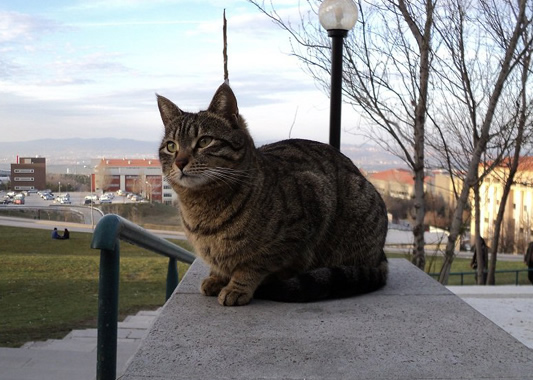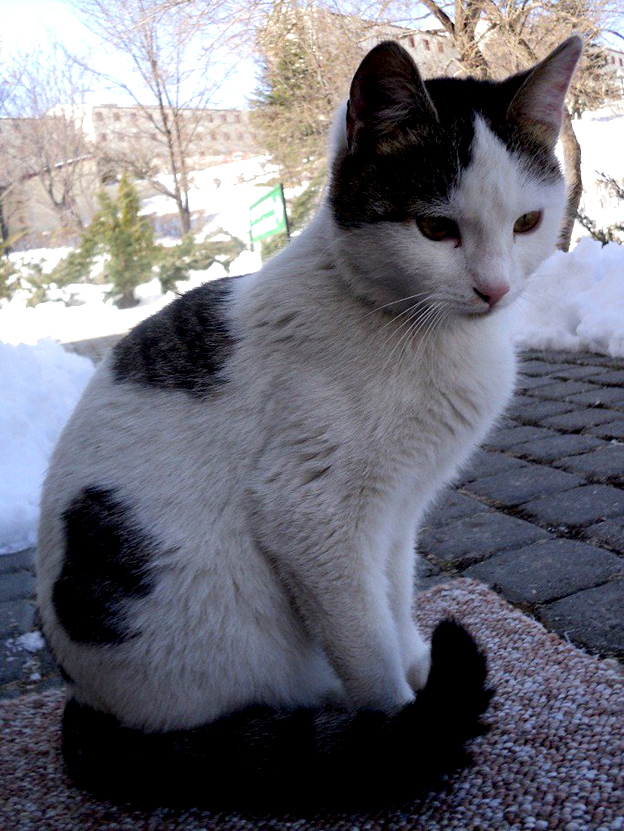Bilcat Cares for Bilkent's Resident Cats

The combination of many different things makes our campus environment unique, and a large cat population can be considered among these. Many cats live within the boundaries of our campus, and many of these cats are outdoor cats. Living outdoors is not easy, even for cats. They sometimes face big problems while trying to satisfy basic needs like water, food, and shelter. Bilcat was established by a group of faculty members in 2004 to help the outdoor cats living on campus. Another aim of Bilcat is to contribute to the process of creating an environment in which people and animals live in harmony with each other.
Bilcat focuses heavily on improving the living conditions of the campus cats. Neutering and spaying are among the most important Bilcat activities related to the health of the cats. Since many of the outdoor cats face serious problems living outdoors, it is very important to keep the outdoor cat population under control. Neutering and spaying also helps to provide much better conditions for the existing outdoor cats. Bilcat cooperates with the Bilkent Veterinary Clinic in Çamlık Sitesi for neutering, spaying, and other issues related with the health of the cats. A large number of cats have been neutered and spayed in last seven years. Today, the majority of the outdoor cat population on campus is sterile.
Since the campus cats are living outdoors, they are exposed to many factors that can cause problems for their health. So, Bilcat tries to make sure that outdoor cats go through special health treatment to protect them from such problems. This treatment includes vaccination and anti-parasite treatment. Bilcat also helps with the adoption of the campus cats.
Bilcat also attends to campus cats experiencing specific difficulties. A case in point is Zeynep, a female cat living in the dorm area on Main Campus. Last spring, she was found with a broken leg. Bilcat caught her and took her to and the Ankara University Veterinary Faculty for surgery. She was returned to the dorm area after a long healing process under the care of a visiting Fulbright scholar. Another case is Bleachy, a male cat living on Middle Campus. Last autumn, one of his eyes was severely damaged as a result of a fight, and he was taken to the local vet clinic for medical treatment. Although the veterinarians did their best to treat the eye, the cornea proved to be so badly damaged that the eye had to be removed before he was returned to campus as a one-eyed cat. A third case is Efe/Henry, an 11-year-old male cat in the housing area on Main Campus. He was seen to have significant difficulties urinating a few weeks ago, and has recently been returned to the lojman area after being treated for urinary tract infection in the local vet clinic.
 While Bilcat is doing a lot to help campus cats, it is clear that campus is no paradise for cats, and there are numerous incidents of cats being tragically killed by dogs and cars or trapped to death inside of buildings and the water pipe system. Sadly, this happens most often to cats that people have abandoned on campus. As pointed out by Asst. Prof. Tore Fougner in the Department of International Relations: "Cats that have lived an indoor life should never be irresponsibly abandoned to an outdoor life that they are not prepared for. Rather, they should be re-adopted through friends or veterinarians. One should also be very careful about moving outdoor cats from an environment that they know well to a completely new environment with dangers unknown to them." Abandoning a pet to the wild is shameful act of animal cruelty.
While Bilcat is doing a lot to help campus cats, it is clear that campus is no paradise for cats, and there are numerous incidents of cats being tragically killed by dogs and cars or trapped to death inside of buildings and the water pipe system. Sadly, this happens most often to cats that people have abandoned on campus. As pointed out by Asst. Prof. Tore Fougner in the Department of International Relations: "Cats that have lived an indoor life should never be irresponsibly abandoned to an outdoor life that they are not prepared for. Rather, they should be re-adopted through friends or veterinarians. One should also be very careful about moving outdoor cats from an environment that they know well to a completely new environment with dangers unknown to them." Abandoning a pet to the wild is shameful act of animal cruelty.
Bilcat highly recommends that you do yourself a favor and meet with campus cats when you have a chance. Bilcat believes you will like these little intelligent and sensitive residents of our campus as much as we do. Helping outdoor cats will make our campus a more beautiful place. Never forget that the campus cats are campus residents and Bilkenters too.